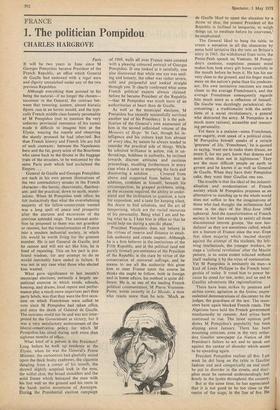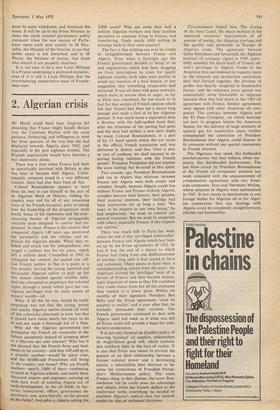FRANCE
1. The politician Pompidou
CHARLES HARGROVE
Paris It will be two years in June since M Georges Pompidou became President of the French Republic, an office which General de Gaulle had endowed with a regal aura and dignity unmatched under any of the two previous Republics.
Although everything then pointed to his being the natural—if no longer the chosen— successor to the General, the contrast bet- ween that towering, austere, almost hieratic figure, cast an an heroic mould, and the typi- cally French middle-class homely personality of M Pompidou (not to mention the very unheroic provincial resonance of his name) made it difficult to imagine him at the Elysee, wearing the mantle and observing the stately protocol he had inherited. But then French history and French life are full of such contrasts: between the Napoleonic hero and the fat, gouty scion of the Bourbons who came back to the throne in the baggage train of the invaders, to be welcomed by the same Paris mob which had acclaimed the Empire ...
General de Gaulle and Georges Pompidou are each in his own person illustrations of the two contradictory streaks in the French character—the heroic, chauvinistic, flamboy- ant; and the practical, down to earth, mater- ialistic. When M Pompidou took office, he felt instinctively that what the overwhelming majority of his fellow-countrymen wanted was a long spell of peace and prosperity after the alarums and excursions of the previous splendid reign. The national ambi- tion he proposed to them was not grandeur or renown, but the transformation of France into a modern industrial society, in which life would be worth living for the greatest number. He is not General de Gaulle, and he cannot and will not act like him, he is fond of repeating. This on his part is pro- found wisdom, for any attempt to do so would inevitably have ended in failure. It was not in any case what those who elected him wanted.
What gave significance to last month's municipal elections, normally a largely un- political exercise in which roads, schools, housing, and drains, local repute and perforg mance play a much more important part than party labels, was that they were the first occa- sion on which Frenchmen were called to vote since M Pompidou had taken office, and since the death of General 'de Gaulle. The outcome could not be and was not inter- preted by the Government as victory; but it was a very satisfactory endorsement of the liberal-conservative policy for which M Pompidou has stood• during no* more than eighteen months of office.
What kind of a person is the President? Long before he took up residence at the Elysee, when he was the General's Prime Minister, the cartoonists had gleefully seized upon the thick bushy eyebrows, the cigarette dangling from a corner of his mouth, the shrewd slightly sceptical look in the eyes, the wilful chin, the broad shoulders and the solid frame which betrayed the man with his feet well on the ground and his roots in the harsh native mountains of Auvergne. During the Presidential election campaign of 1969, walls all over France were covered with a pleasing coloured portrait of Georges Pompidou. If one looked at it carefully, one also discovered that while one eye was smil- ing and homely, the other was rather severe, cold and purposeful and looked straight through you. It clearly confirmed what some French political experts always claimed before he became President of the Republic —that M Pompidou was much more of an authoritarian at heart than de Gaulle.
As well as the municipal elections, M Pompidou has recently successfully survived another test of his Presidency. It is the pub- lication of the General's own assessment of him in the second unfinished volume of the Memoirs of Hope: 'In fact, though his in- telligence and his culture kept him abreast of every idea, by nature he always tended to consider the practical side of things. While he admired brilliance in action, risk in un- dertakings, boldness in authority, he inclined towards discreet attitudes and cautious proceedings, excelling furthermore in every case when it came to mastering the facts and discovering a solution . . . Covered from above and supported from below, but in addition, confident in himself, beneath his circumspection, he grasped problems, using, as the occasion required, the ability to under- stand and the inclination to question, a turn for exposition, and a taste for keeping silent,
the desire to find solutions, and the art of temporising, which are the varied resources of his personality. Being what I am and be- ing what he is, I kept him in office so that he could help me during a specific phase.'
President Pompidou does not believe in the virtues of reserve and distance .to estab- lish authority and create respect. Although he is a firm believer in the institutions of the Fifth Republic, and in the political (and not purely formal) pre-eminence of the President of the Republic in the state by virtue of the consecration of universal suffrage, and he means to use all the authority this gives him to steer France upon the course he thinks she ought to follow, both in foreign and in home affairs, his method is quite dif- ferent. He is, as one of the leading French political commentators, M Pierre Viansson- Ponte, wrote recently in Le Monde, a man who reacts more than he acts. 'Much as
de Gaulle liked to upset the situation by a throw of dice, the present President of the Republic is inclined to temporise, to weigh things up, to meditate before he intervenes,' he emphasised.
The General liked to bang the table, to create a sensation in all the chanceries by some bold initiative like the veto on Britain's entry in 1963, the withdrawal from NATO, the Pnom-Penh speech on Vietnam. M Pompi- dou's cautious, suspicious peasant mind makes him look every gift horse carefully in the mouth before he buys it. He has his ear very close to the ground, and his finger much more on the nation's pulse than his predeces, sor. His own instinctive reactions are much closer to the average Frenchman's, and the average Frenchman consequently regards him much more as a reflection of himself. De Gaulle was dazzlingly paradoxical, dis-, concerting: a traditionalist with the ambi- tions of a social revolutionary, a general who distrusted the army. M Pompidou is a much more rational, accessible and reassur-1 ing personality.
Yet there is a malaise—some Frenchmen, over-eagerly, even speak of a political crisis. M Pompidou himself speaks of a certain 'greyness' of life. 'Frenchmen,' he is quoted as saying, 'want me to make them dream, no more. 1, for my part, know that dreams end more often than not in nightmares.' They are the most difficult people on earth to govern and he knows it as well as General de Gaulle. When they have their Pompidou cake, they want their Gaullist one too.
The trouble is that the ideal of the industri-! alisation and modernisation of French society which M Pompidou proposes as an alternative to standing up to the whole world does not suffice to fire the imaginations of those who had thought the millennium had come in the days of the May-June 1968 upheaval. And the transformation of French society is not fast enough to satisfy all those discontented interest groups, 'the new feu- dalisms' as they are sometimes called, which are a feature of France since the war. Even that silent majority which reacted sharply against the attempt of the students, the left- wing intellectuals, the younger workers, to stage a 'cultural revolution' after the Maoist pattern, is to some extent infected without itself realising it by the virus of contestation. Yet M Pompidou is eminently its man—a kind of Louis Philippe to the French bour- geoisie of today. It voted him to power be- cause he stood for law, order, and an end to Gaullist adventures like regionalisation.
There have been strikes by postmen and airline crews; agitation in the lycees; unpre- cedented demonstrations of discontent by the judges, the guardians of the law. The team- sters have again blocked French roads. The Algerians have held the French government unashamedly to ransom. And prices have continued to rise. The latest opinion poll shows M Pompidou's popularity has been slipping since January. There has been mounting criticism, even in the very ortho- dox Gaullist newspaper La Nation of the President's failure to act and •to speak out against the canker of disorder which seems to be spreading again.
President Pompidou realises all this. Last week he did bang on the table in Gaullist fashion and said categorically an end must be put to disorder in the streets, and disci- pline must be restored understandingly but firmly in the lycdes throughout the country.
But at the same time, he has appreciated that it is not good to be too close to the centre of the stage, in the line of fire. He
must be more withdrawn, and dominate the scene. It will be up to the Prime Minister to make the much awaited government policy statement when the new session of Parlia- ment opens early next month; to M Mar- cellin, the Minister of the Interior, to see that public peace is not disturbed; and to M Pleven, the Minister of Justice, that those who disturb it are properly chastised.
It is not easy to be a new Louis Philippe in a France undergoing a profound mutation, even if it is still a Louis Philippe that the overwhelming conservative mass of French- men want.



































 Previous page
Previous page